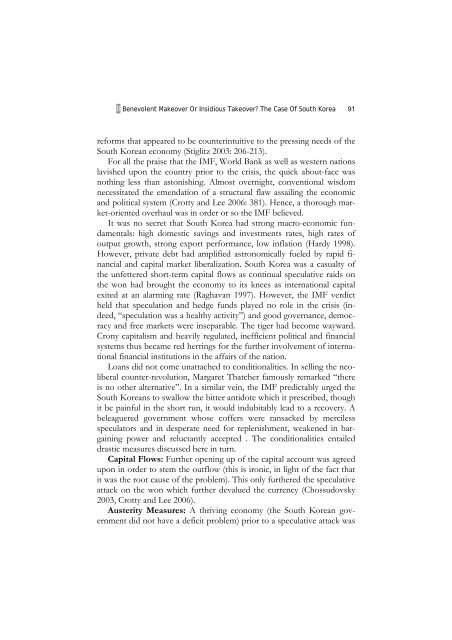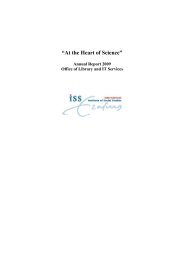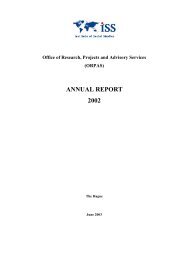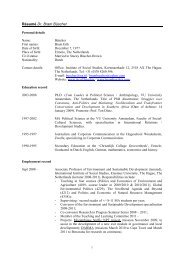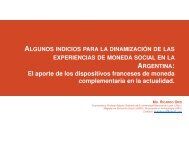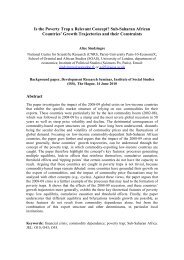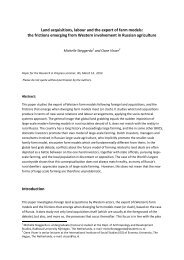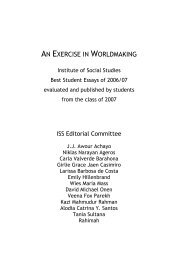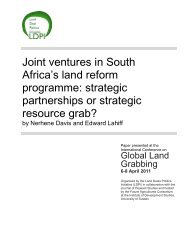AN EXERCISE IN WORLDMAKING 2009 - ISS
AN EXERCISE IN WORLDMAKING 2009 - ISS
AN EXERCISE IN WORLDMAKING 2009 - ISS
Create successful ePaper yourself
Turn your PDF publications into a flip-book with our unique Google optimized e-Paper software.
8 Benevolent Makeover Or Insidious Takeover? The Case Of South Korea 91<br />
reforms that appeared to be counterintuitive to the pressing needs of the<br />
South Korean economy (Stiglitz 2003: 206-213).<br />
For all the praise that the IMF, World Bank as well as western nations<br />
lavished upon the country prior to the crisis, the quick about-face was<br />
nothing less than astonishing. Almost overnight, conventional wisdom<br />
necessitated the emendation of a structural flaw assailing the economic<br />
and political system (Crotty and Lee 2006: 381). Hence, a thorough market-oriented<br />
overhaul was in order or so the IMF believed.<br />
It was no secret that South Korea had strong macro-economic fundamentals:<br />
high domestic savings and investments rates, high rates of<br />
output growth, strong export performance, low inflation (Hardy 1998).<br />
However, private debt had amplified astronomically fueled by rapid financial<br />
and capital market liberalization. South Korea was a casualty of<br />
the unfettered short-term capital flows as continual speculative raids on<br />
the won had brought the economy to its knees as international capital<br />
exited at an alarming rate (Raghavan 1997). However, the IMF verdict<br />
held that speculation and hedge funds played no role in the crisis (indeed,<br />
“speculation was a healthy activity”) and good governance, democracy<br />
and free markets were inseparable. The tiger had become wayward.<br />
Crony capitalism and heavily regulated, inefficient political and financial<br />
systems thus became red herrings for the further involvement of international<br />
financial institutions in the affairs of the nation.<br />
Loans did not come unattached to conditionalities. In selling the neoliberal<br />
counter-revolution, Margaret Thatcher famously remarked “there<br />
is no other alternative”. In a similar vein, the IMF predictably urged the<br />
South Koreans to swallow the bitter antidote which it prescribed, though<br />
it be painful in the short run, it would indubitably lead to a recovery. A<br />
beleaguered government whose coffers were ransacked by merciless<br />
speculators and in desperate need for replenishment, weakened in bargaining<br />
power and reluctantly accepted . The conditionalities entailed<br />
drastic measures discussed here in turn.<br />
Capital Flows: Further opening up of the capital account was agreed<br />
upon in order to stem the outflow (this is ironic, in light of the fact that<br />
it was the root cause of the problem). This only furthered the speculative<br />
attack on the won which further devalued the currency (Chossudovsky<br />
2003, Crotty and Lee 2006).<br />
Austerity Measures: A thriving economy (the South Korean government<br />
did not have a deficit problem) prior to a speculative attack was


